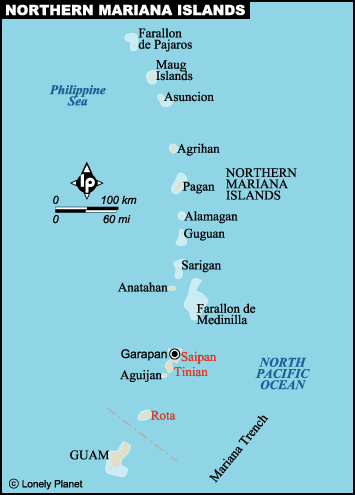The United States of America includes more than just the 50 states. It also includes three unincorporated organized territories and two commonwealths. The territories are the US Virgin Islands, Guam, and American Samoa while the commonwealths are Puerto Rico and the Northern Mariana Islands. It also includes nine uninhabited territories administered by the Department of the Interior. These includes two islands famous for their battles during WWII: Wake and Midway.
Thus, when a Second Amendment case comes up involving the Commonwealth of the Northern Mariana Islands, it is of interest. Making it even more interesting is that it is a case jointly supported by the Second Amendment Foundation and the NRA Civil Rights Legal Defense Fund. The case is Radich et al v. Deleon Guerrero and it is being heard in the US District Court for the Commonwealth of the Northern Mariana Islands.
Before I get into the case, a little reminder as to geography. The Northern Mariana Islands are located in the Pacific Ocean northeast of the Philippines and are much closer to the Asian continental mainland than they are to the continental United States. Students of WWII will recognize the island chain for the important battles fought for two of its more important islands - Saipan and Tinian. Moreover, the Enola Gay took off for Hiroshima from Tinian.
Like Puerto Rico, the Northern Mariana Islands enjoys commonwealth status with the United States as a result of the approval in 1976 by Congress of a Covenant to establish a Commonwealth of the Northern Mariana Islands in Political Union with the United States of America. This covenant was fully ratified in 1986 when qualified residents were granted US citizenship. The covenant also applies United States law, in general, to the CNMI and a US District Court was established there by Act of Congress in 1977. The District Court is part of the 9th Circuit.
Radich v. Delon Guerrero is a challenge to the Commonwealth's restriction on handgun possession and carry. It seeks both a preliminary and permanent injunction against the Commonwealth's enforcement of their Weapons Control Act as well as a finding that the Act violates the Second and Fourteenth Amendments on both their face and as applied to the plaintiffs. These laws include:
(a) the prohibitions on virtually all CNMI residents from obtaining handguns for self-defense purposes; (b) the prohibition on obtaining a WIC and possessing a firearm for self-defense purposes; and (c) the good cause requirement for obtaining a WIC,
The plaintiffs are David and Li-Rong Radich who are residents of Saipan, CNMI. Mr. Radich is a US citizen born in California and a Navy veteran working as an environmental consultant. His wife, Li-Rong, is a Chinese citizen with permanent legal resident status. They have been married since 2009. In 2010, while Mr. Radich was out of town on business, Mrs. Radich was the victim of a home invasion and suffered broken ribs, facial contusions, and a suspected orbital fracture.
In 2013, the plaintiffs applied to the CNMI Department of Public Safety for a Weapons Identification Card so as to provide for their self-defense. Despite the requirement that a decision be made within 60 days, the plaintiffs are still waiting for an answer from the Department of Public Safety in violation of the law.
With the Supreme Court's decisions in the Heller and McDonald cases as well as the 9th Circuit's decision in Peruta v. San Diego, it would seem that this case bodes well for the plaintiffs. Guam has already changed their laws to bring themselves into compliance with Peruta.
Alan Gottlieb of the Second Amendment Foundation notes:
“The Second Amendment does not just apply to the continental United States and Hawaii,” noted SAF founder and Executive Vice President Alan M. Gottlieb. “It also applies to territories under U.S. jurisdiction. The issue is a fundamental civil right, not only to possess a handgun, but also to use firearms for self-defense purposes, which is currently banned in the Northern Marianas.”It is a fundamental civil right and one that the District Court in the North Mariana Islands ought to recognize. Too bad that the Commonwealth's government didn't recognize this right.
UPDATE: Professor Eugene Volokh of UCLA provides a note on the Volokh Conspiracy blog about this case. He points out that the CNMI Covenant expressly states that Amendments 1 through 9 inclusive are applicable in the Northern Mariana Islands.







I suspect that, due to the changes in the status of CNMI and its residents, someone realized the Insular Cases probably don't apply quite the same way anymore. . . the only Insular Case that post-dates MAJOR structural changes in the status of the CNMI (and Puerto Rico) highlights this, by applying the Fourth Amendment to Puerto Rico and striking down a PR law on searches (Torres v. Puerto Rico, 442 U.S. 465).
ReplyDeleteThanks for the clarification on the use of the Insular Cases.
DeleteGoing to be interesting...
ReplyDeleteFor what it is worth, Virginia, Kentucky, Pennsylvania, and Massachusetts are also commonwealths, not states.
ReplyDeleteWhile those four commonwealths are not states, they are members of the United States, not just commonwealths.
ReplyDeleteI don't recall the Senator from the Marianas ever taking the floor to denounce anything....
Massachusetts, Illinois, California, New Jersey and Hawaii are also known as "Behind Enemy Lines".
ReplyDeleteNot sure about California being entirely behind enemy lines, but most of the coastal One-Party Rule Cities certainly are. Up here in the hills we have a lot of guns and even CCWs are common, so we may not out-number the coastal residents voting-bloc, but we can out-shoot them and prevent their movement upward and outward since we hold the high-ground...
ReplyDelete